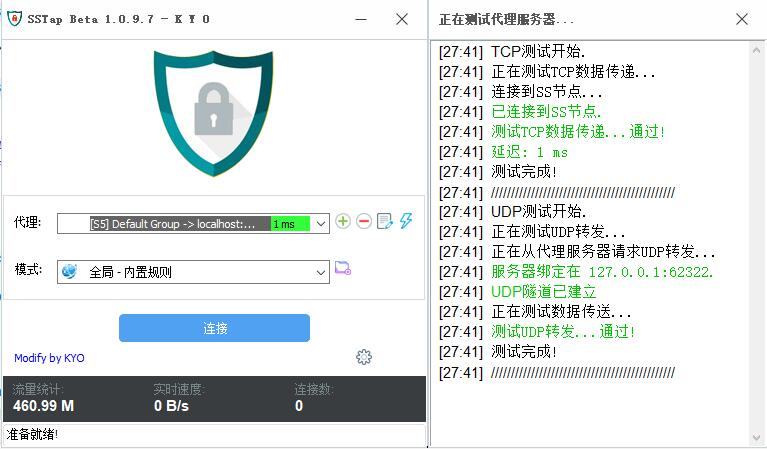socks5
This is a Golang implementation of the Socks5 protocol library.
To see in this SOCKS Protocol Version 5.
This library is also compatible with Socks4 and Socks4a.
Features
- socks5:
- command: CONNECT, UDP ASSOCIATE, BIND.
- auth methods:
- Username/Password authentication.
- No Authentication Required.
- socks4:
- command: CONNECT, BIND.
- auth: (no support).
- sock4a: same as socks4.
- Custom client and server authenticator.
- Easy to read source code.
- Similar to the Golang standard library experience.
Install
go get "github.com/haochen233/socks5"
Example
Server
simple(no authentication):
package main
import (
"log"
"github.com/haochen233/socks5"
)
func main() {
// create socks server.
srv := &socks5.Server{
// socks server listen address.
Addr: "127.0.0.1:1080",
// UDP assocaite and bind command listen ip.
// Don't need port, the port will automatically chosen.
BindIP: "127.0.0.1",
// if nil server will provide no authentication required method.
Authenticators: nil,
}
// start listen
err := srv.ListenAndServe()
if err != nil {
log.Fatal(err)
}
}
username/password authentication in memory:
package main
import (
"crypto/md5"
"log"
"github.com/haochen233/socks5"
)
func main() {
// create a username/password store in memory.
var userStorage socks5.UserPwdStore = socks5.NewMemeryStore(md5.New(), "secret")
// set a pair of username/password.
userStorage.Set("admin", "123456")
srv := &socks5.Server{
Addr: "127.0.0.1:1080",
BindIP: "127.0.0.1",
// enable username/password method and authenticator.
Authenticators: map[socks5.METHOD]socks5.Authenticator{
socks5.USERNAME_PASSWORD: socks5.UserPwdAuth{UserPwdStore: userStorage},
// There is already an authentication method.
// If want enable no authentication required method.
// you should enable it explicit.
socks5.NO_AUTHENTICATION_REQUIRED: socks5.NoAuth{},
},
}
err := srv.ListenAndServe()
if err != nil {
log.Fatal(err)
}
}
custom transporter to transmit data between client and remote.
package main
import (
"log"
"net"
"github.com/haochen233/socks5"
)
// simulate to impl socks5.Transporter interface.
// transport encrypted data.
type cryptTransport struct {
}
func (c *cryptTransport) TransportTCP(client *net.TCPConn, remote *net.TCPConn) <-chan error {
//encrypt data and send to remote
//decrypt data and send to client
return nil
}
func (c *cryptTransport) TransportUDP(server *socks5.UDPConn, request *socks5.Request) error {
panic("implement me")
return nil
}
func main() {
server := &socks5.Server{
Addr: "127.0.0.1:1080",
BindIP: "127.0.0.1",
// replace default Transporter interface
Transporter: &cryptTransport{},
}
err := server.ListenAndServe()
if err != nil {
log.Fatal(err)
}
}
Client
CONNECT usage:
package main
import (
"log"
"github.com/haochen233/socks5"
)
func main() {
// create socks client
clnt := socks5.Client{
ProxyAddr: "127.0.0.1:1080",
// Authenticator supported by the client.
// It must not be nil.
Auth: map[socks5.METHOD]socks5.Authenticator{
// If client want send NO_AUTHENTICATION_REQUIRED method to server, must
// add socks5.NoAuth authenticator explicitly
socks5.NO_AUTHENTICATION_REQUIRED: &socks5.NoAuth{},
},
}
// client send CONNECT command and get a tcp connection.
// and use this connection transit data between you and www.google.com:80.
conn, err := clnt.Connect(socks5.Version5, "www.baidu.com:80")
if err != nil {
log.Fatal(err)
}
// close connection.
conn.Close()
}
UDP_ASSOCIATE usage:
package main
import (
"fmt"
"log"
"github.com/haochen233/socks5"
)
func main() {
clnt := socks5.Client{
ProxyAddr: "127.0.0.1:1080",
// client provide USERNAME_PASSWORD method and
// NO_AUTHENTICATION_REQUIRED.
Auth: map[socks5.METHOD]socks5.Authenticator{
socks5.NO_AUTHENTICATION_REQUIRED: &socks5.NoAuth{},
socks5.USERNAME_PASSWORD: &socks5.UserPasswd{Username: "admin", Password: "123456"},
},
}
// client send UDP_ASSOCIATE command and get a udp connection.
// Empty local addr string a local address (127.0.0.1:port) is automatically chosen.
// you can specific a address to tell socks server which client address will
// send udp data. Such as clnt.UDPForward("127.0.0.1:9999").
conn, err := clnt.UDPForward("")
if err != nil {
log.Fatal(err)
}
defer conn.Close()
// send every datagram should add UDP request header.
someData := []byte("some data")
// dest addr where are you send to.
destAddr, _ := socks5.ParseAddress("127.0.0.1:9190")
// packing socks5 UDP data with dest addr.
pakcedData, err := socks5.PackUDPData(destAddr, someData)
// final send you data
conn.Write(pakcedData)
// on the contrary.
// you should unpacked the packet, after received every packedData.
buf := make([]byte, 65507)
conn.Read(buf)
// unpacking data.
destAddr, unpackedData, err := socks5.UnpackUDPData(buf)
// operate your udp data.
fmt.Println(unpackedData)
}
BIND usage:
package main
import (
"encoding/binary"
"github.com/haochen233/socks5"
"log"
)
func main() {
c := socks5.Client{
ProxyAddr: "172.16.1.28:1080",
Auth: map[socks5.METHOD]socks5.Authenticator{
socks5.USERNAME_PASSWORD: &socks5.UserPasswd{"admin", "123456"},
socks5.NO_AUTHENTICATION_REQUIRED: &socks5.NoAuth{},
},
}
// connect
conn1, err := c.Connect(5, "127.0.0.1:9000")
if err != nil {
log.Fatal(err)
}
dest := "127.0.0.1:9001"
// bind
bindAddr, errors, conn2, err := c.Bind(4, dest)
if err != nil {
log.Fatal(err)
}
// An example tell dest about socks server bind address
// via CONNECT proxy connection.
port := make([]byte, 2)
binary.BigEndian.PutUint16(port, bindAddr.Port)
conn1.Write(append(bindAddr.Addr, port...))
// wait the second reply. if nil the dest already
// established with socks server.
err = <-errors
if err != nil {
log.Fatal(err)
return
}
// bind success
_, err = conn2.Write([]byte("hello"))
if err != nil {
return
log.Fatal(err)
}
}







